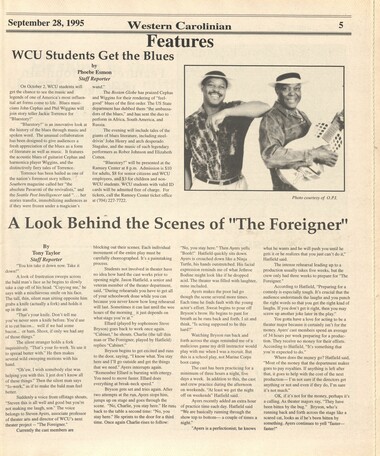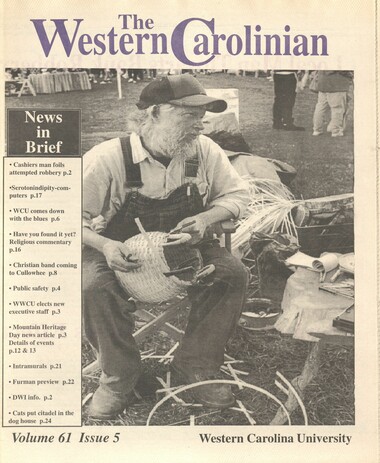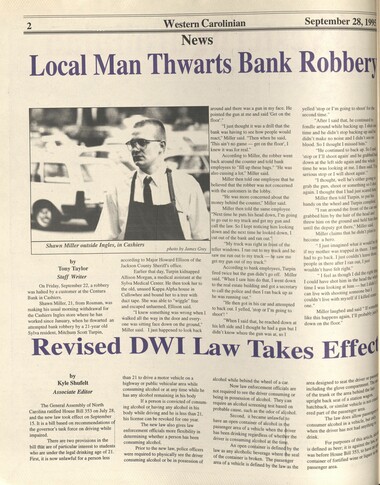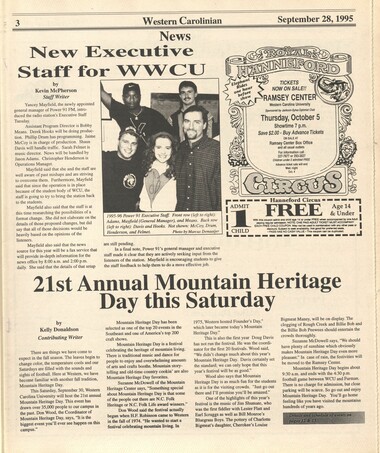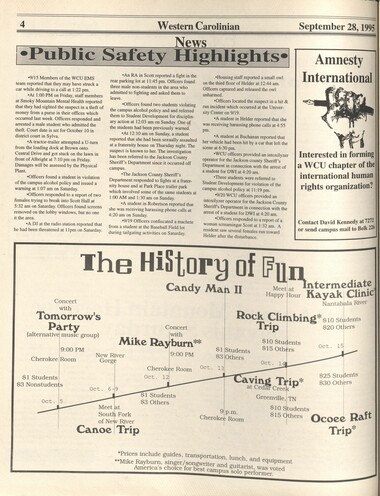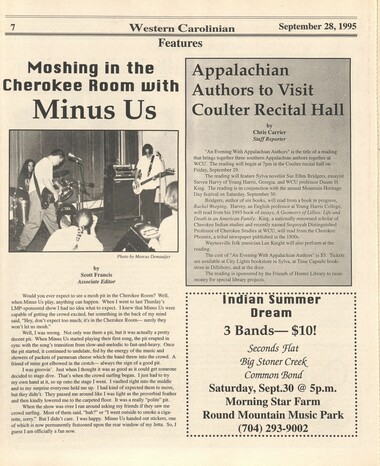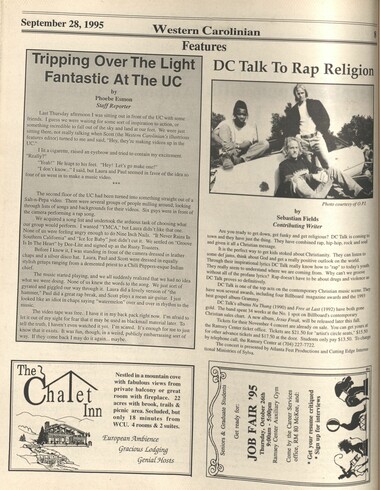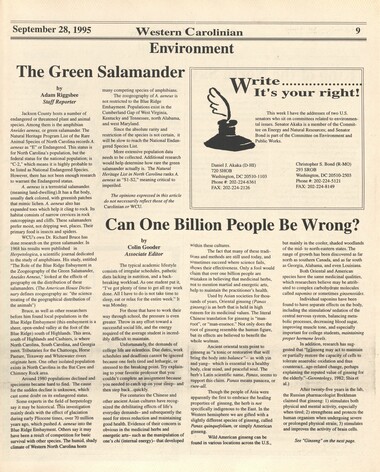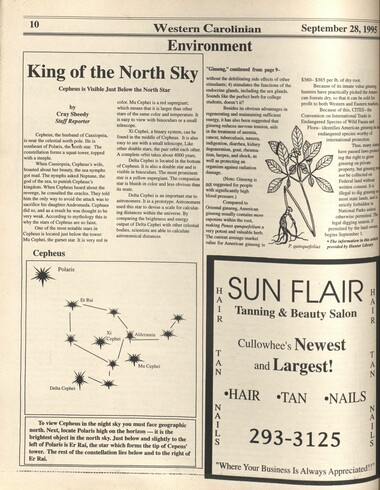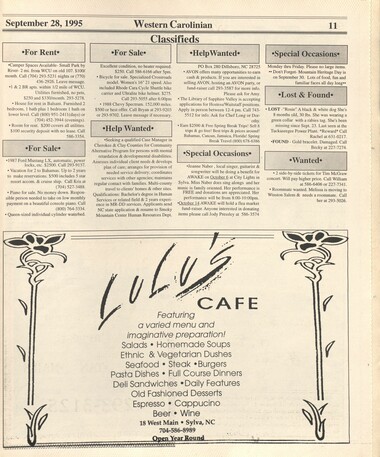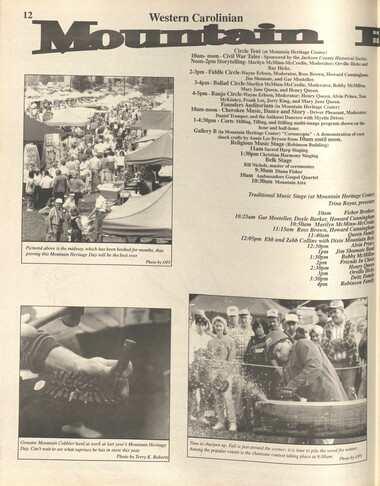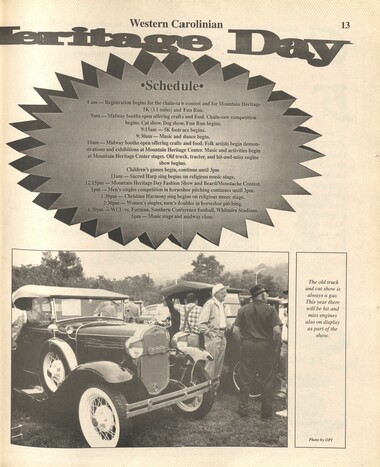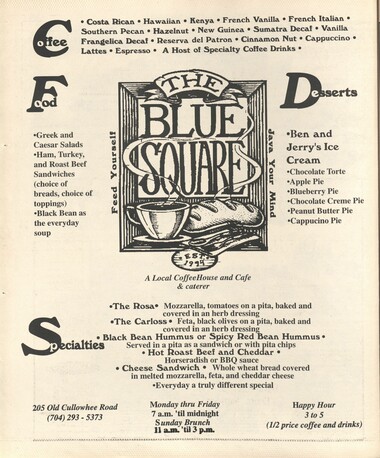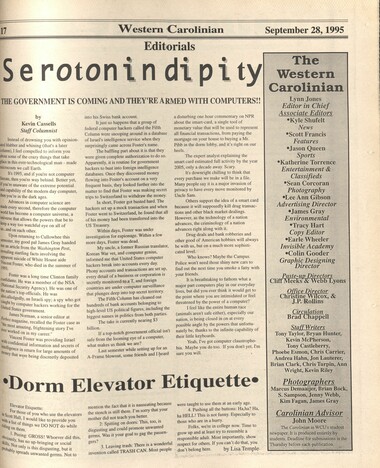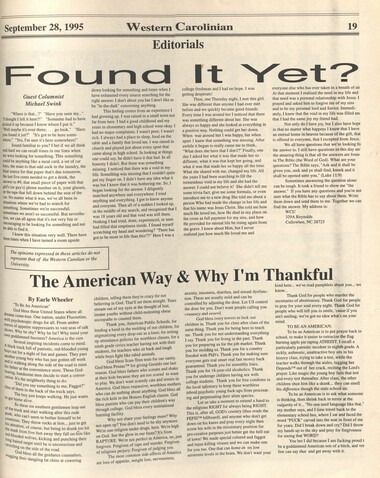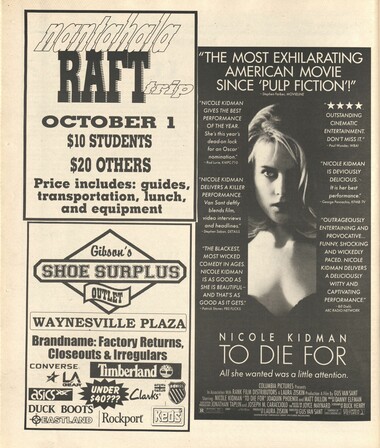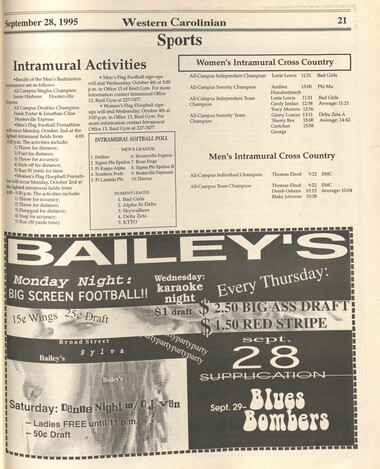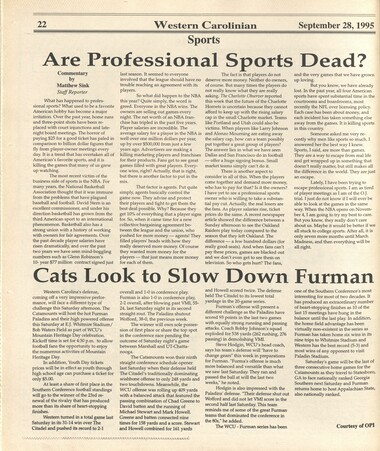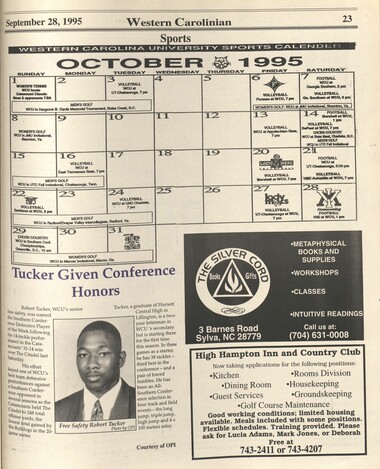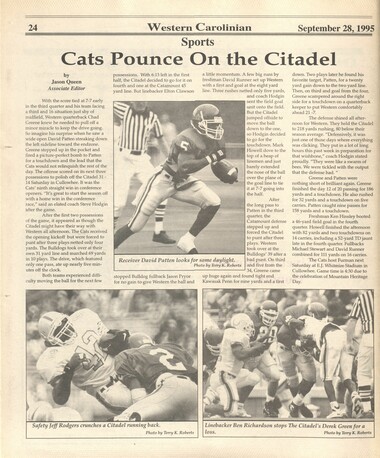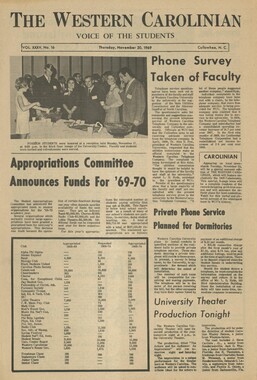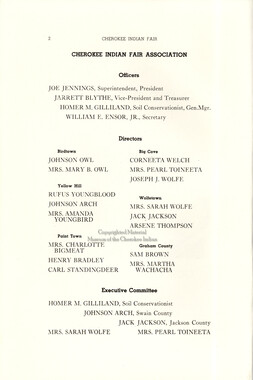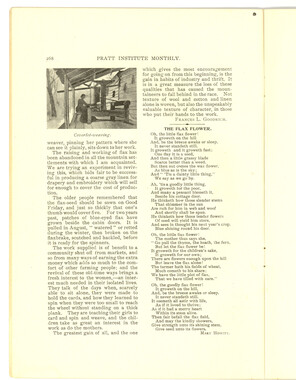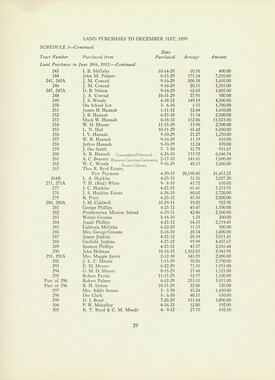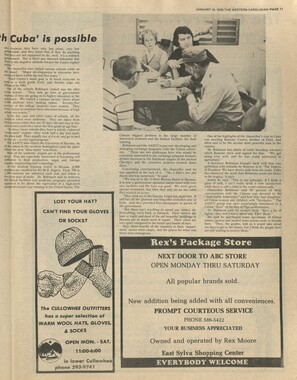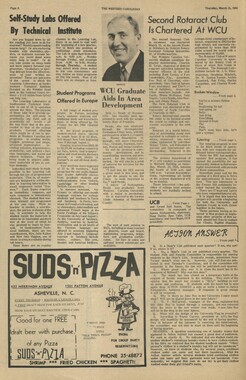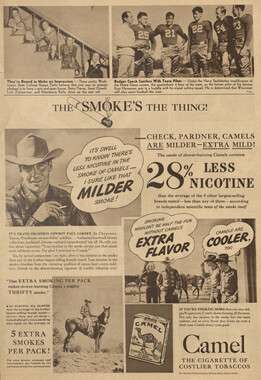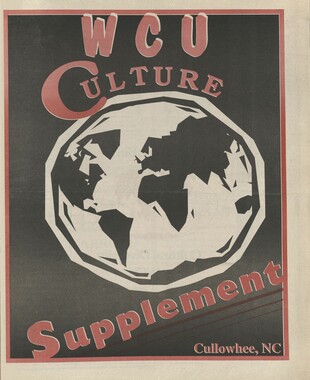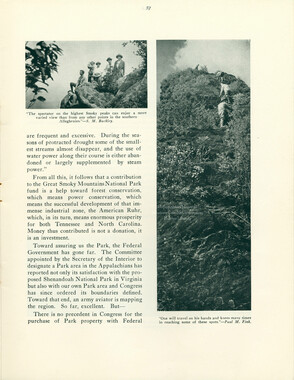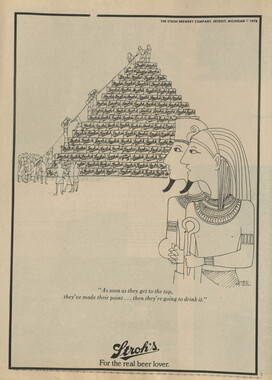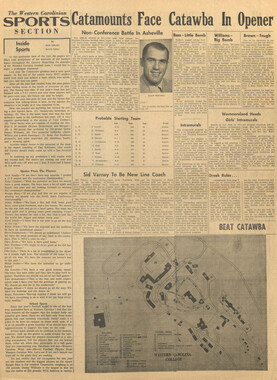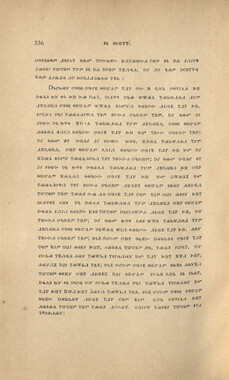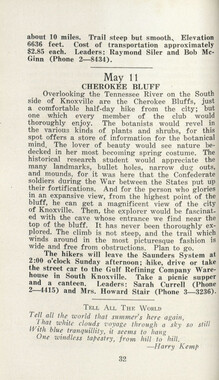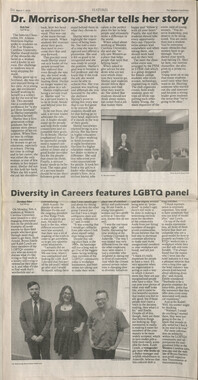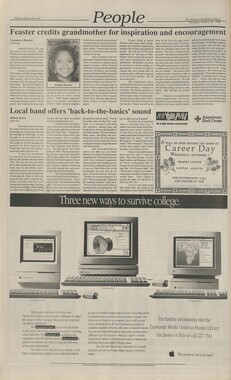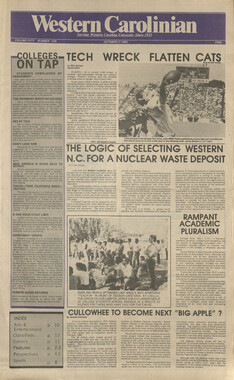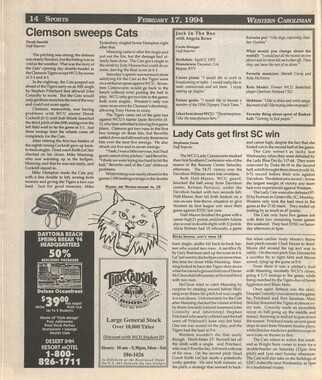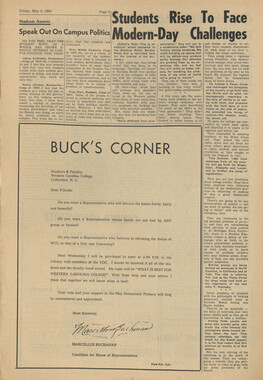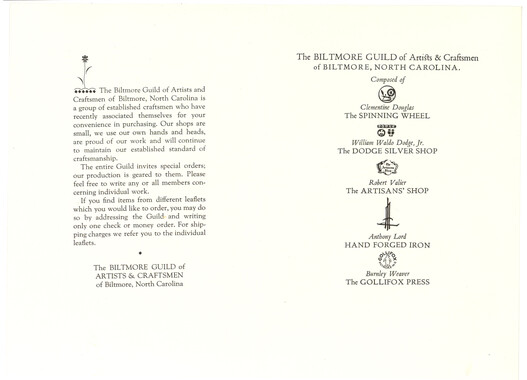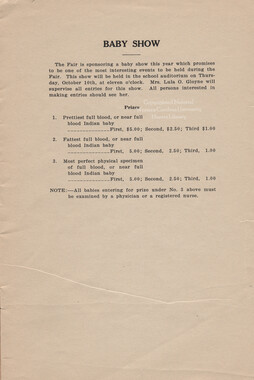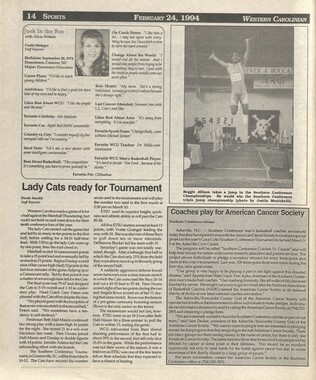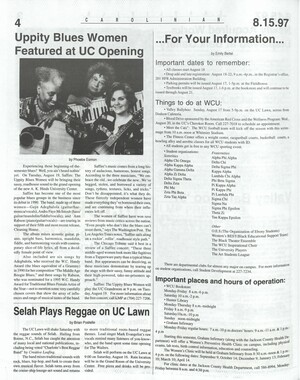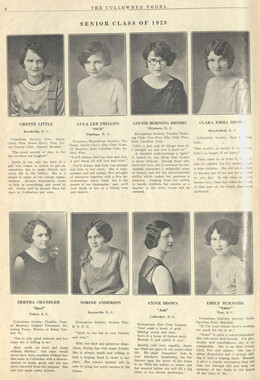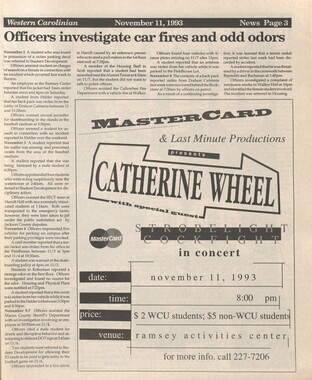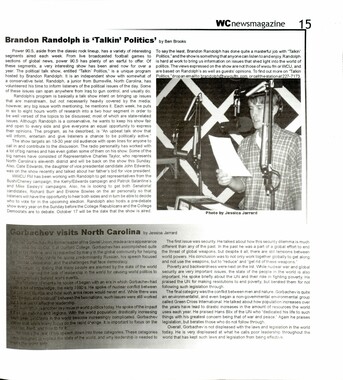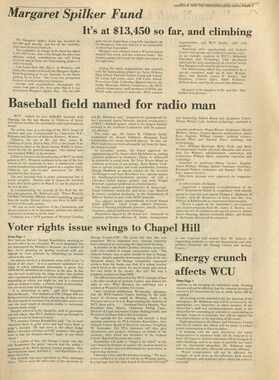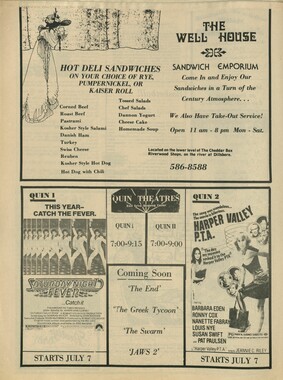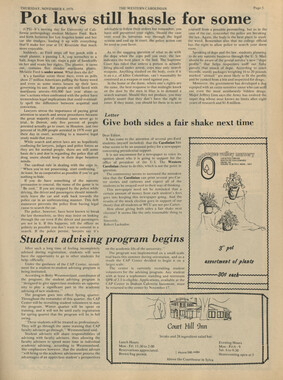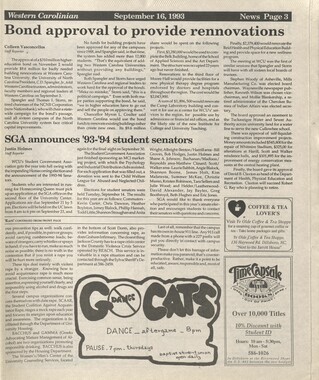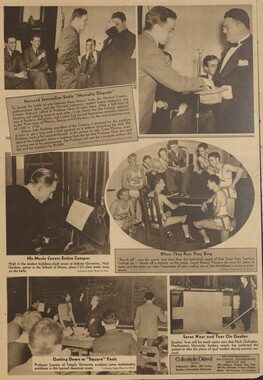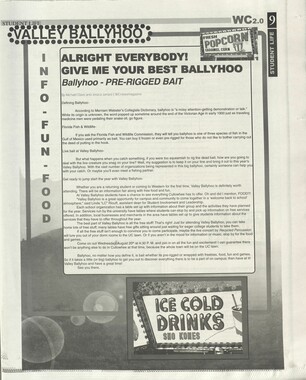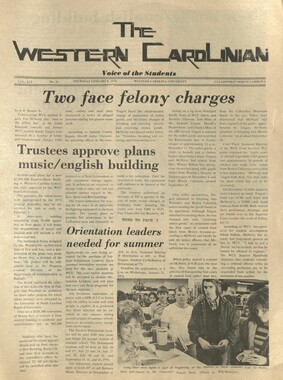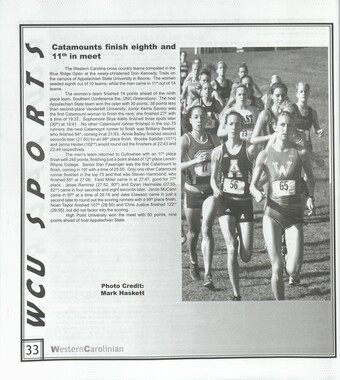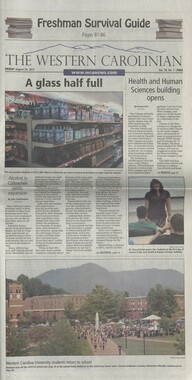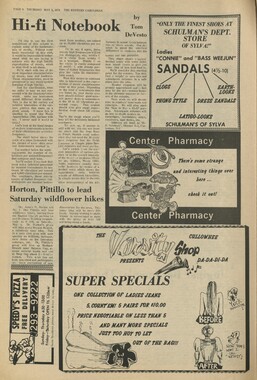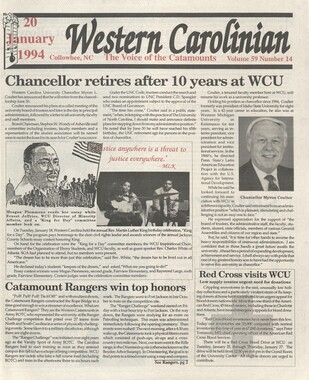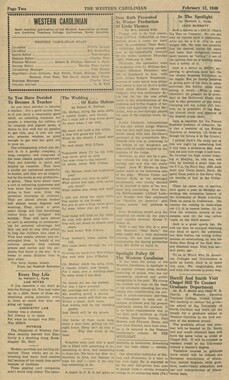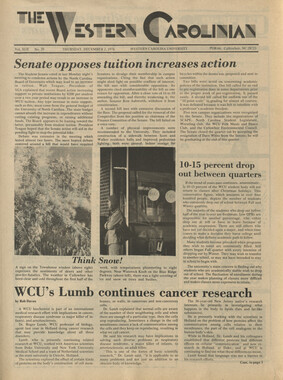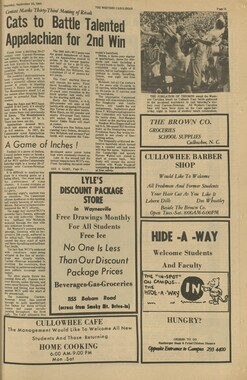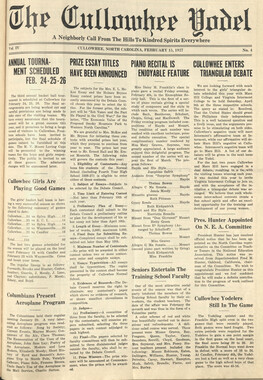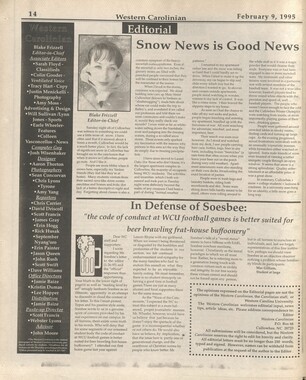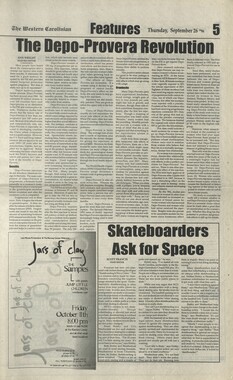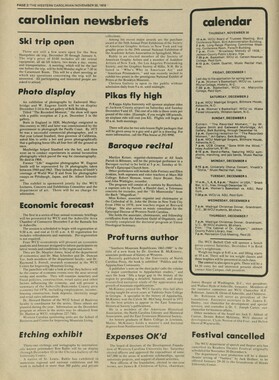Western Carolina University (21)
View all
- Canton Champion Fibre Company (2308)
- Cherokee Traditions (291)
- Civil War in Southern Appalachia (165)
- Craft Revival (1942)
- George Masa Collection (137)
- Great Smoky Mountains - A Park for America (3080)
- Highlights from Western Carolina University (422)
- Horace Kephart (973)
- Journeys Through Jackson (159)
- LGBTQIA+ Archive of Jackson County (89)
- Oral Histories of Western North Carolina (317)
- Picturing Appalachia (6617)
- Stories of Mountain Folk (413)
- Travel Western North Carolina (153)
- Western Carolina University Fine Art Museum Vitreograph Collection (129)
- Western Carolina University Herbarium (92)
- Western Carolina University: Making Memories (738)
- Western Carolina University Publications (2491)
- Western Carolina University Restricted Electronic Theses and Dissertations (146)
- Western North Carolina Regional Maps (71)
- World War II in Southern Appalachia (131)
University of North Carolina Asheville (6)
View all
- Allanstand Cottage Industries (62)
- Appalachian National Park Association (53)
- Bennett, Kelly, 1890-1974 (1463)
- Berry, Walter (76)
- Brasstown Carvers (40)
- Carver, George Washington, 1864?-1943 (26)
- Cathey, Joseph, 1803-1874 (1)
- Champion Fibre Company (233)
- Champion Paper and Fibre Company (297)
- Cherokee Indian Fair Association (16)
- Cherokee Language Program (22)
- Crowe, Amanda (40)
- Edmonston, Thomas Benton, 1842-1907 (7)
- Ensley, A. L. (Abraham Lincoln), 1865-1948 (275)
- Fromer, Irving Rhodes, 1913-1994 (70)
- George Butz (BFS 1907) (46)
- Goodrich, Frances Louisa (120)
- Grant, George Alexander, 1891-1964 (96)
- Heard, Marian Gladys (60)
- Kephart, Calvin, 1883-1969 (15)
- Kephart, Horace, 1862-1931 (313)
- Kephart, Laura, 1862-1954 (67)
- Laney, Gideon Thomas, 1889-1976 (439)
- Masa, George, 1881-1933 (61)
- McElhinney, William Julian, 1896-1953 (44)
- Niggli, Josephina, 1910-1983 (10)
- North Carolina Park Commission (105)
- Osborne, Kezia Stradley (9)
- Owens, Samuel Robert, 1918-1995 (11)
- Penland Weavers and Potters (36)
- Roberts, Vivienne (15)
- Roth, Albert, 1890-1974 (142)
- Schenck, Carl Alwin, 1868-1955 (1)
- Sherrill's Photography Studio (2565)
- Southern Highland Handicraft Guild (127)
- Southern Highlanders, Inc. (71)
- Stalcup, Jesse Bryson (46)
- Stearns, I. K. (213)
- Thompson, James Edward, 1880-1976 (226)
- United States. Indian Arts and Crafts Board (130)
- USFS (683)
- Vance, Zebulon Baird, 1830-1894 (1)
- Weaver, Zebulon, 1872-1948 (58)
- Western Carolina College (230)
- Western Carolina Teachers College (282)
- Western Carolina University (2008)
- Western Carolina University. Mountain Heritage Center (18)
- Whitman, Walt, 1819-1892 (10)
- Wilburn, Hiram Coleman, 1880-1967 (73)
- Williams, Isadora (3)
- Cain, Doreyl Ammons (0)
- Crittenden, Lorraine (0)
- Rhodes, Judy (0)
- Smith, Edward Clark (0)
- Appalachian Region, Southern (3032)
- Asheville (N.C.) (1945)
- Avery County (N.C.) (26)
- Blount County (Tenn.) (195)
- Buncombe County (N.C.) (1680)
- Cherokee County (N.C.) (283)
- Clay County (N.C.) (556)
- Graham County (N.C.) (238)
- Great Smoky Mountains National Park (N.C. and Tenn.) (525)
- Haywood County (N.C.) (3573)
- Henderson County (N.C.) (70)
- Jackson County (N.C.) (4924)
- Knox County (Tenn.) (35)
- Knoxville (Tenn.) (13)
- Lake Santeetlah (N.C.) (10)
- Macon County (N.C.) (421)
- Madison County (N.C.) (216)
- McDowell County (N.C.) (39)
- Mitchell County (N.C.) (135)
- Polk County (N.C.) (35)
- Qualla Boundary (982)
- Rutherford County (N.C.) (78)
- Swain County (N.C.) (2185)
- Transylvania County (N.C.) (270)
- Watauga County (N.C.) (12)
- Waynesville (N.C.) (86)
- Yancey County (N.C.) (72)
- Aerial Photographs (3)
- Aerial Views (60)
- Albums (books) (4)
- Articles (1)
- Artifacts (object Genre) (228)
- Bibliographies (1)
- Biography (general Genre) (2)
- Cards (information Artifacts) (38)
- Clippings (information Artifacts) (192)
- Copybooks (instructional Materials) (3)
- Crafts (art Genres) (622)
- Depictions (visual Works) (21)
- Design Drawings (1)
- Digital Moving Image Formats (2)
- Drawings (visual Works) (185)
- Envelopes (101)
- Exhibitions (events) (1)
- Facsimiles (reproductions) (1)
- Fiction (general Genre) (4)
- Financial Records (12)
- Fliers (printed Matter) (67)
- Glass Plate Negatives (381)
- Guidebooks (2)
- Internegatives (10)
- Interviews (822)
- Land Surveys (102)
- Letters (correspondence) (1045)
- Manuscripts (documents) (618)
- Maps (documents) (177)
- Memorandums (25)
- Minutes (administrative Records) (59)
- Negatives (photographs) (6090)
- Newsletters (1290)
- Newspapers (2)
- Notebooks (8)
- Occupation Currency (1)
- Paintings (visual Works) (1)
- Pen And Ink Drawings (1)
- Periodicals (194)
- Personal Narratives (10)
- Photographs (12977)
- Plans (maps) (1)
- Poetry (6)
- Portraits (4568)
- Postcards (329)
- Programs (documents) (181)
- Publications (documents) (2444)
- Questionnaires (65)
- Relief Prints (26)
- Sayings (literary Genre) (1)
- Scrapbooks (282)
- Sheet Music (2)
- Slides (photographs) (402)
- Songs (musical Compositions) (2)
- Sound Recordings (801)
- Specimens (92)
- Speeches (documents) (18)
- Tintypes (photographs) (8)
- Transcripts (328)
- Text Messages (0)
- A.L. Ensley Collection (275)
- Appalachian Industrial School Records (7)
- Appalachian National Park Association Records (336)
- Axley-Meroney Collection (2)
- Bayard Wootten Photograph Collection (20)
- Bethel Rural Community Organization Collection (7)
- Blumer Collection (5)
- C.W. Slagle Collection (20)
- Canton Area Historical Museum (2110)
- Carlos C. Campbell Collection (462)
- Cataloochee History Project (64)
- Cherokee Studies Collection (4)
- Daisy Dame Photograph Album (5)
- Daniel Boone VI Collection (1)
- Doris Ulmann Photograph Collection (112)
- Elizabeth H. Lasley Collection (1)
- Elizabeth Woolworth Szold Fleharty Collection (4)
- Frank Fry Collection (95)
- George Masa Collection (173)
- Gideon Laney Collection (452)
- Hazel Scarborough Collection (2)
- Hiram C. Wilburn Papers (28)
- Historic Photographs Collection (236)
- Horace Kephart Collection (861)
- Humbard Collection (33)
- Hunter and Weaver Families Collection (1)
- I. D. Blumenthal Collection (4)
- Isadora Williams Collection (4)
- Jesse Bryson Stalcup Collection (47)
- Jim Thompson Collection (224)
- John B. Battle Collection (7)
- John C. Campbell Folk School Records (80)
- John Parris Collection (6)
- Judaculla Rock project (2)
- Kelly Bennett Collection (1482)
- Love Family Papers (11)
- Major Wiley Parris Civil War Letters (3)
- Map Collection (12)
- McFee-Misemer Civil War Letters (34)
- Mountain Heritage Center Collection (4)
- Norburn - Robertson - Thomson Families Collection (44)
- Pauline Hood Collection (7)
- Pre-Guild Collection (2)
- Qualla Arts and Crafts Mutual Collection (12)
- R.A. Romanes Collection (681)
- Rosser H. Taylor Collection (1)
- Samuel Robert Owens Collection (94)
- Sara Madison Collection (144)
- Sherrill Studio Photo Collection (2558)
- Smoky Mountains Hiking Club Collection (616)
- Stories of Mountain Folk - Radio Programs (374)
- The Reporter, Western Carolina University (510)
- Venoy and Elizabeth Reed Collection (16)
- WCU Gender and Sexuality Oral History Project (36)
- WCU Mountain Heritage Center Oral Histories (25)
- WCU Oral History Collection - Mountain People, Mountain Lives (71)
- WCU Students Newspapers Collection (1923)
- Western North Carolina Tomorrow Black Oral History Project (69)
- William Williams Stringfield Collection (2)
- Zebulon Weaver Collection (109)
- African Americans (390)
- Appalachian Trail (35)
- Artisans (521)
- Cherokee art (84)
- Cherokee artists -- North Carolina (10)
- Cherokee language (21)
- Cherokee pottery (101)
- Cherokee women (208)
- Church buildings (190)
- Civilian Conservation Corps (U.S.) (111)
- College student newspapers and periodicals (2012)
- Dams (108)
- Dance (1023)
- Education (222)
- Floods (63)
- Folk music (1015)
- Forced removal, 1813-1903 (2)
- Forest conservation (220)
- Forests and forestry (1198)
- Gender nonconformity (4)
- Great Smoky Mountains National Park (N.C. and Tenn.) (181)
- Hunting (47)
- Landscape photography (25)
- Logging (122)
- Maps (83)
- Mines and mineral resources (9)
- North Carolina -- Maps (18)
- Paper industry (38)
- Postcards (255)
- Pottery (135)
- Railroad trains (72)
- Rural electrification -- North Carolina, Western (3)
- School integration -- Southern States (2)
- Segregation -- North Carolina, Western (5)
- Slavery (5)
- Sports (452)
- Storytelling (243)
- Waterfalls -- Great Smoky Mountains (N.C. and Tenn.) (66)
- Weaving -- Appalachian Region, Southern (280)
- Wood-carving -- Appalachian Region, Southern (328)
- World War, 1939-1945 (173)
Western Carolinian Volume 61 Number 05 (06)
Item
Item’s are ‘child’ level descriptions to ‘parent’ objects, (e.g. one page of a whole book).
-
-
September 28,1995 Western Carolinian Features WCU Students Get the Blues by Phoebe Esmon Staff Reporter On October 2, WCU students will get the chance to see the music and legends of one of America's most influential art forms come to life. Blues musicians John Cephas and Phil Wiggins will join story teller Jackie Torrence for "Bluestory!" "Bluestory!" is an innovative look at the history of the blues through music and spoken word. The unusual collaboration has been designed to give audiences a fresh appreciation of the blues as a form of literature as well as music. It features the acoustic blues of guitarist Cephas and harmonica player Wiggins, and the distinctively fiery tales of Torrence. Torrence has been hailed as one of the nation's foremost story tellers. Southern magazine called her "the absolute Pavarotti of the revivalists," and the Seattle Post Intelligencer said ". . . her stories transfix, immobilizing audiences as if they were frozen under a magician's wand." The Boston Globe has praized Cephas and Wiggins for their rendering of "feelgood" blues of the first order. The US State department has dubbed them "the ambassadors of the blues," and has sent the duo to perform in Africa, South America, and Russia. The evening will include tales of the giants of blues literature, including steel- drivin' John Henry and arch desperado Stagalee, and the music of such legendary performers as Rober Johnson and Elizabeth Cotten. "Bluestory!" will be presented at the Ramsey Center at 8 p.m. Admission is $10 for adults, $8 for senior citizens and WCU employees, and $3 for children and non- WCU students. WCU students with valid ID cards will be admitted free of charge. For tickets, call the Ramsey Center ticket office at (704) 227-7722. Photo courtesy of O.P.I. A Look Behind the Scenes of "The Foreigner" By Tony Taylor StaffReporter "You kin take it down now. Take it down!" A look of frustration sweeps across the bald man's face as he begins to slowly take a cup off of his head. "Copying me," he says with a mischievous smile on his face. The tall, thin, silent man sitting opposite him grabs a knife (actually a fork) and holds it up in the air. "That's your knife. Don't tell me you've never seen a knife before. You'd use it to cut bacon... well if we had some bacon... or ham. Shoot, if only we had any of those things." The silent stranger holds a fork inquisitively. "That's your fo-werk. Ye use it to spread butter with." He then makes several wild sweeping motions with his hand. "Oh'ew, I wish somebody else was helping you with this. I jest don't know all of these things." Then the silent man says "fo-werk," as if to make the bald man feel better. Suddenly a voice from offstage shouts, "Steven this is all well and good but you're not making me laugh, son." The voice belongs to Steven Ayers, associate professor of theater arts and director of WCU's next theater project - "The Foreigner." Currently the cast members are blocking out their scenes. Each individual movement of the entire play must be carefully choreographed. It's a painstaking process. Students not involved in theater have no idea how hard the cast works prior to opening night. Jason Hatfield, a senior and veteran member of the theater department, said, "During rehearsals you have to get all of your schoolwork done while you can because you never know how long rehearsal will last. Sometimes it can last until the wee hours of the morning_ it just depends on what stage you're at." Ellard (played by sophomore Steve Bryson) goes back to work once again. "Cabinet," he shouts. Charlie (the tall thin man or The Foreigner, played by Hatfield) replies "Cabinet." Bryson begins to get excited and runs to the door, saying, "I know what. You stay here and I'll go outside and get the things that we need." Ayers interrupts again. "Remember Ellard is bursting with energy. You need to move faster. Ellard does everything at break-neck speed." Bryson gets set and tries again. After two attempts at the run, Ayers stops him, jumps up on stage and goes through the scene. "No, Charlie, you stay here." He runs back to the table a second time: "No, you stay here." He sprints to the door for a third time. Once again Charlie rises to follow: "No, you stay here." Then Ayers yells "Booh!" Hatfield quickly sits down. Ayers is crouched down like a Ninja Turtle, his hands outstretched. His facial expression reminds me of what Jethroe Bodine might look like if he dropped acid. The theater was filled with laughter, mine included. Ayers makes the poor lad go though the scene several more times. Each time he finds fault with the young actor's effort. Sweat begins to pour off Bryson's brow. He begins to pant for breath as he runs back and forth. I sit and think, "Is acting supposed to be this hard?" Watching Bryson run back and forth across the stage reminded me of a malicious game my drill instructor would play with me when I was a recruit. But this is a school play, not Marine Corps boot camp. The cast has been practicing for a minimum of three hours a night, five days a week. In addition to this, the cast and crew practice during the afternoon on weekends. "At least we get the night off on weekends" Hatfield said. Ayers recently added an extra hour of practice time each day. Hatfield said "We are basically running through the show top to bottom— a couple of times a night." "Ayers is a perfectionist; he knows what he wants and he will push you until he gets it or he realizes that you just can't do it," Hatfield said. The intense rehearsal leading up to a production usually takes five weeks, but the crew only had three weeks to prepare for "The Foreigner." According to Hatfield, "Preparing for a comedy is especially tough. It's crucial that the audience understands the laughs and you punch the right words so that you get the right kind of laughs. If you don't get it right, then you may screw up another joke later in the play." You gotta have a love for acting to be a theater major because it certainly isn't for the money. Ayers' cast members spend an average of 34 hours per week preparing for a production. They receive no money for their efforts. According to Hatfield, "It's something that you're expected to do." Where does the money go? Hatfield said, "Most of the money that the department makes goes to pay royalties. If anything is left after that, it goes to help with the cost of the next production— I'm not sure if the directors get anything or not and even if they do, I'm sure it's not much." OK, if it's not for the money, perhaps it's a calling. As theater majors say, "They have been bitten by the bug." Bryson, who's running back and forth across the stage like a scared cat, looks as if he's been bitten by something. Ayers continues to yell "faster— faster!"
Object
Object’s are ‘parent’ level descriptions to ‘children’ items, (e.g. a book with pages).
-
The Western Carolinian is Western Carolina University's student-run newspaper. The paper was published as the Cullowhee Yodel from 1924 to 1931 before changing its name to The Western Carolinian in 1933.
-
